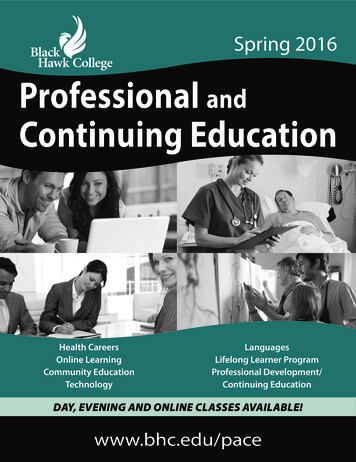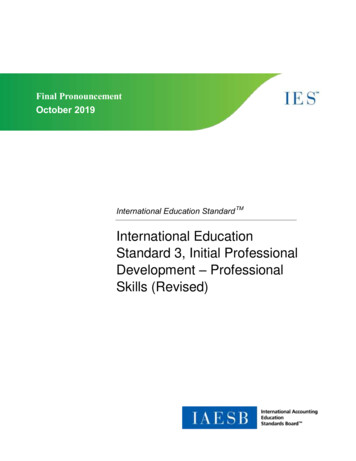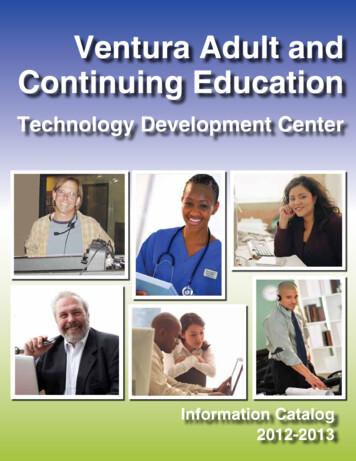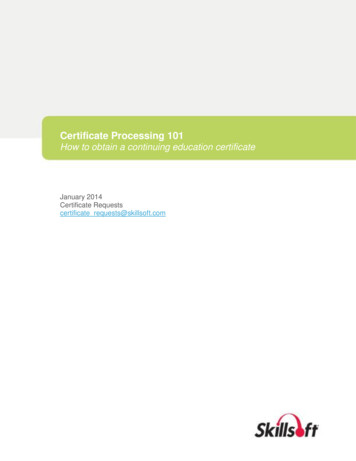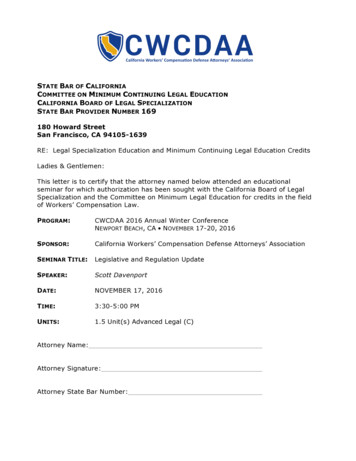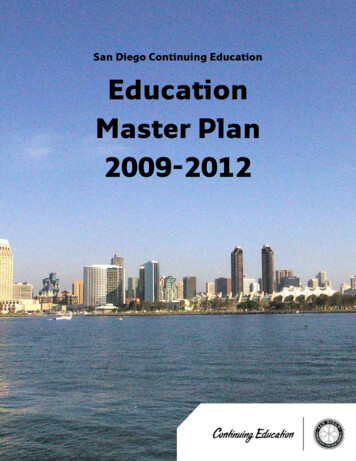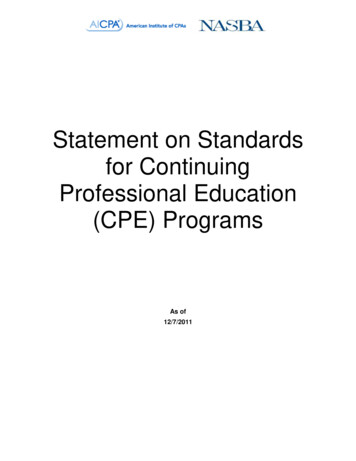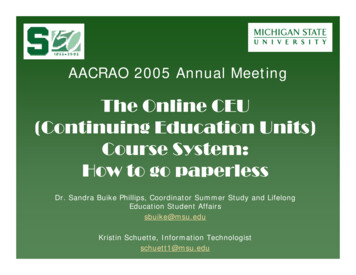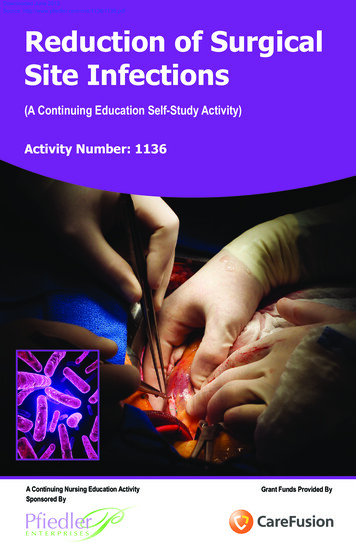
Transcription
School of Professional Development and Continuing EducationVeteran’s HandbookPolicies and Procedures forProfessional Development ProgramsECPI UniversitySchool of Professional Development and Continuing Education5555 Greenwich RoadVirginia Beach, VA 23462The following is a handbook of policies and procedures related to programs offered byECPI University School of Professional Development and Continuing Education.This handbook is a supplement to the division’s schedule of classes. Schedules are posted atwww.ecpi.edu/continuing-education and are revised as necessary to remain current.Volume 4, Number 12019
Professional Development and Continuing Education Web Address:www.ecpi.edu/continuing-educationOffice Location Phone Numbers:Virginia Beach 757.671.7171 Ext. 55308Newport News 757.671.7171 Ext. 55308Northern Virginia (Manassas) 757.671.7171 Ext. 55308The following information is provided for the Veteran who wishes to take an ECPI ProfessionalDevelopment course or program and is not sure how to start the process.VETERANS EDUCATION BENEFITSWHERE TO GO FOR HELP, INFORMATION AND QUESTIONSThe Virginia Department of Veterans Services, Veterans Education and Training provides thefollowing website address and the toll free phone number for general questions on VeteransEducation Benefits:Internet: www.gibill.va.gov (Links: “FAQ” or “Submit a Question”)Toll Free Call: 1-888-GIBILL1 (1-888-442-4551)Contact ECPI’s VA Certifying OfficialsVirginia Beach Campus: John Nichols 757-671-7171 Ext. 55275 Email JNichols@ecpi.eduNewport News Campus: Gina Boyd 757-838-9191 Ext. 74236 Email GBoyd@ecpi.eduNorthern Virginia Campus: Carla Taylor 757.671.7171 Ext. x55265 CaTaylor@mttsvc.comContact ECPI’s Executive Director of Military AffairsBill Brown 757-671-7171 Ext. 56209 Email WBrown@mil.ecpi.eduECPI University is accredited by the Southern Association of Colleges andSchools Commission on Colleges (SACSCOC) to award the associate’s,baccalaureate, and master’s degrees and diplomas. SACSCOC is the regionalbody for the accreditation of degree-granting higher education institutions inthe Southern states. For more information visit www.sacscoc.org. The Schoolof Professional Development and Continuing Education is a division of ECPIUniversity.i
Veteran’s HandbookTable of ContentsI.PageSchedule of Classes. 1II.Division Calendar, Days and Times of Operation . 1III.Policy and Regulations on Enrollment . 1IV.Policy and Regulations on Attendance . 2V.Policy and Regulations on Standards of Progress. 2VI.Policy and Regulations on Student Conduct . 4VII.Statement on Schedule of Fees . 6VIII.Policy and Regulations on Refunds . 6IX.Policy on Reinstating Student After Prolonged Absence . 6X.Statement on Credit for Previous Education and Training . 7Appendix A: Professional Development Division Officials and Instructional StaffAppendix B: Catalog of Programs (Course Descriptions)Acknowledgement of Receipt Form[Updated August 5, 2019]ii
I.Schedule of ClassesThe School of Professional Development and Continuing Education publishes class schedules on thedivision’s website and is updated and revised as needed.II.Calendar of Important Dates:The School of Professional Development and Continuing Education is closed on the following dates:September 2, 2019November 28, 2019December 23, 2019 - January 1, 2020January 20, 2020May 25, 2020June 29-July 5, 2020September 7, 2020November 26, 2020December 24, 2020 – January 3, 2021Labor DayThanksgiving HolidayWinter BreakMartin Luther King Jr. birthdayMemorial DaySummer BreakLabor DayThanksgiving HolidayWinter BreakMultiple evening schedules offered through 2019-2020, for current listing go es/Professional Development and Continuing Education days and times of operation follow theUniversity’s normal office hours: Monday through Friday, 8:30 a.m.-5:00 p.m. (Exceptions may occurat any of the office locations. Call ahead or check online. Office phone numbers may be found on pagei.)III.Policy and Regulations on EnrollmentRegistration - Registration is continuous throughout the year. For each program, registration beginsonce a start date has been established for a program, and continues throughout the term until twobusiness days before the specific program begins. Requests for registration after the “two-day prior”deadline will be considered on a case-by-case basis.Entrance Requirements – In general, applicants for enrollment into the Professional Development (NonCredit) certificate programs must meet the following requirements: 1) be 18 years of age; and 2) have ahigh school diploma or GED.Program Specific Requirements – Beyond minimal requirements, other requirements for successfulcompletion of a program may exist. Any additional requirements are published in specific programdescriptions. [See Appendix B]1
IV.Policy and Regulations on AttendanceECPI believes students should follow a policy of regular attendance and punctuality to receive themaximum benefit from an ECPI education and to develop the work habits and personal qualities highlyvalued by employers. Therefore, students are expected to attend all regularly scheduled class meetings.The student should attempt to notify the faculty member assigned to the course, by telephone or email, inadvance of any anticipated absence. Faculty and staff may likewise contact the student via telephone,email, or social media if the student is absent.On the first day of class for each course, the faculty member will make available the course syllabus whichincludes the specific attendance policy and opportunities, if any, to make up missed assignments for thatcourse.Late Arrivals and Early Departures. Students are encouraged to contact the faculty member for thecourse, by telephone or email, if the student anticipates being late for class. Being tardy is defined asstudent arrival after class attendance has been taken. Leaving prior to class dismissal is considered earlydeparture. Students are not allowed to disrupt academic processes and, at the faculty member’s discretion,admission to a class may be denied to tardy students until the next class break. Late arrivals and earlydepartures may affect a student’s record of attendance.Make-up Tests. Tests are typically announced in advance so that a student may prepare. Students mustcomplete the required tests on the stated schedule. Students who miss an original (first administered) testfor sufficient and documented reasons may arrange with the faculty member for that course to take a makeup test and receive full credit. Make-up tests will normally be given the day the student returns to school.Examples of sufficient reason include third-party written documentation of illness, medical, or dentalemergencies, work schedule conflicts, military duty assignments, court appearances, funerals, or familyemergencies. A make-up test is an examination of equal or greater difficulty given in a subject area. Onlyone make-up will be allowed per course.Late Assignments. A student who has excused documented absence will have the opportunity to earn fullcredit for any missed assignments that are submitted late. Assignments turned in late due to a documentedexcused absence will be graded as initially assigned.V.Policy and Regulations on Standards of Progress and GradesUnless otherwise stated in any specific program description, the following general grade and attendancestandards for satisfactory progress will apply:A. Coursework will be evaluated throughout each course within a program, and a final grade will beawarded at the end of the each course.B. In general and unless otherwise stated, the minimum grade average to maintain satisfactory progressis 70%. The course syllabus outlined in each program will be followed for determining academicprogress.2
C. The student’s progress will be evaluated in each course by the student’s ability to complete and turnin approved assessments, including homework, quizzes, tests and other assignments. The quality ofthe work will also be taken into consideration during the evaluation process.D. The minimum attendance standard to maintain satisfactory progress is to be in attendance for 80% ofthe total class hours of instruction.Failure to complete courses successfully for any reason may negatively affect satisfactory academicprogress. Failing courses or withdrawing from courses could result in academic dismissal.If the student is unable to complete work to be evaluated, a grade of “I” (Incomplete) may be assigned.Incomplete grades. Incomplete (“I”) grade may be assigned at the faculty member’s discretion uponrequest by the student to permit the student time to complete required coursework which he/she wasprevented from completing in a timely manner due to non–academic reasons. The faculty member mayrequire the student to document the request to assist in the decision. The faculty member may choose notto grant the request. The “I” grade should be considered only when the student has the potential to earn apassing grade if the missing work is made up.To be eligible for an “I” grade, the student must have a passing grade in the course at the time of therequest based upon the required coursework up to that point and must have completed at least 75% of thecourse work. All incomplete work must be completed within the first week of the immediately subsequentterm; exceptions must be approved by the program director or his/her designee. When the work iscompleted, the faculty member will submit a grade change form with the final grade earned. If the workis not completed within the prescribed time frame, the “I” will automatically change to a permanent “F”grade. The student will be informed of the final grade assigned.GradesThe following grades are assigned at the end of a course to indicate the status of the student relative to thesuccessful completion of the course:LetterGradeNumerical GradeEquivalentA93 - 100A-90 - 92B 87 - 89B83 - 86B-80 – 82C 77 - 79C73 - 76C-70 - 72F69 and below3
LetterGradeVI.Other designationsQuality PointsASAdvanced StandingNot computedFAttempted/Withdrawal0IIncompleteNot computedMECredit for Military ExperienceNot computedNPNot PassedNot computedPPassedNot computedTTransferred credit from academicinstitutionNot computedTOTested OutNot computedWAttempted/Withdrawal during add/dropNot computedPolicy and Regulations on Student ConductStudent Rights, Responsibilities, and Conduct.ECPI University and the School of Professional Development and Continuing Education supports thefreedom of the faculty and students to exchange ideas, examine all aspects of issues, and questionassumptions in order to develop the skills and understanding necessary for graduates to qualify foremployment in appropriate occupations and to assume positions as responsible members of society. TheUniversity’s approach to students is to provide a safe and healthy learning environment that promotes theenhancement of each student’s professional life through education. When a student’s conduct adverselyaffects the college’s pursuit of its educational objectives, actions will be taken to remedy the situation. TheSchool’s approach will be to both resolve the problem and to help students learn from their mistakes. Inaccordance with this general philosophy, efforts will always be made to resolve discipline issuesinformally, if possible. The following discusses your rights, responsibilities, and conduct as you pursueyour education.A.Rights and ResponsibilitiesThe submission of an Application for Admission to the School represents a voluntary decision onyour part to participate in the programs offered by the institution pursuant to its policies, rules, andregulations. The School’s approval of your application, in turn, represents the extension of aprivilege to join the School community and to remain a part of it so long as you meet its requiredacademic and behavior standards.You have the privilege of exercising your rights without fear or prejudice as long as you respectthe laws of the state, policies of the University. Students in good standing have access to allinstructional facilities and services, including classes, laboratories, library, tutoring, advising, etc.4
1. Students have the right to inquire about, and to propose, improvements in policies,regulations and procedures affecting the welfare of students through student surveys,MySafeCampusTM, campus clubs and organizations, and University offices.2. The Family Educational Rights and Privacy Act of 1974 provides safeguards regardingthe confidentiality of, and access to, student records, and this Act will be adhered to bythe University. See the heading Family Education Rights and Privacy Act (FERPA) in theUniversity catalog for more detailed information.3. Students may appeal results of tests, examinations, or other grades within one week of theend of the course.4. ECPI decisions affecting a student may be appealed by requesting a review board hearing.5. Students may tape class lectures only with the approval of the faculty member assigned tothe course.B.Student ConductUniversity and the School of Professional Development and Continuing Education disciplinaryaction shall be limited to conduct which adversely affects the University community’s pursuit ofits educational objectives. The following misconduct is subject to disciplinary action up to andincluding withdrawal/ termination:1. Acts of dishonesty, including but not limited to cheating on quizzes, tests, papers, handson homework documentation, or other assignments; or plagiarism.2. Fraudulent activities including but not limited to willful misrepresentation by a studentconcerning qualification for admission, continuing eligibility as a student, eligibility forfinancial aid, current enrollment information, status or position at ECPI.3. Forgery, alteration or misuse of school documents, records or identification.4. The unlawful possession, use, or distribution of illicit or prescription drugs on campus.5. Possession, use, intoxication, or being under the influence of alcohol while on campus.6. Possession of firearms or other weapons on campus.7. Gambling on campus.8. Any act or threat of physical assault or intimidation directed toward any member of theschool community or any other individual on campus.9. Sexual harassment or hazing as described in the Student Non-Harassment Policy andAnti-Hazing Policy.10. Theft or attempted theft of ECPI property, or any theft on campus.11. The defacing or destruction of ECPI property.12. Use of indecent, illegal, disruptive language and/or actions13. Insubordination in carrying out instructions of faculty or staff.5
14. Any refusal to abide with or violation of federal, state, or local regulations.15. Smoking in unauthorized areas.16. Continued violation of the ECPI dress code.17. Furnishing false information to/for/against any student, faculty member or ECPIemployee.The School believes in the use of progressive discipline (verbal warning, written warning anddismissal). However, depending upon the circumstances (i.e., collective student history, seriousnessof conduct, issues of safety, facts surrounding the conduct, etc.), the School reserves the right to useor not use progressive discipline.C.Student Appeal ProceduresThe first line of appeal is for the student to reach out to their instructor and work to resolve anyissues.If the first line of appeal does not produce a satisfactory outcome, the student may then reach outto a Department Head.VII.Statement on Schedule of FeesA detailed listing of fees, charges for tuition, books, supplies, tools, laboratory fees, and all other chargescan be found in each program’s description [Appendix B] as well as in the program’s listing in the semesterschedule of classes (www.ecpi.edu/continuing-education). Fees and other costs can change from one termto the next, but will not change during a term from what is published for that term.VIII.Veteran Refund Policy (Veterans using their Benefits)In the event that a veteran, spouse of a veteran, surviving spouse or child of a veteran is using theirveteran’s benefits to attend school and that person fails to enter the course or withdraws or has discontinuedschooling at any time prior to the completion of the course, the unused portion of the tuition and/or feespaid by the person shall be refunded. The exact amount of the refund will be determined based on theratio of the number of hours of instruction the person completed to the total number of instructional hoursin the course. (Example: A person attends 5 hours of instruction out of 20 total instructional hours. Theperson has completed 25% of the class. Therefore, the person would receive a refund of 75% of the totaltuition.) All refunds will be made within 30 days.To request a refund, e-mail a letter of intent to withdraw to the office of Professional Development (5555Greenwich Road, Suite 104, Virginia Beach, VA 23462 or dabeshaheen@ecpi.edu ). Refunds will beprocessed once the written request is received. Refunds will be issued from ECPI University to the studentif there was attendance in a term. Refunds will be issued to Veteran’s Affairs if a term is paid for in advanceand there is no attendance by the student.IX.Policy on Reinstating Student after Prolonged AbsenceECPI University and the School of Professional Development and Continuing Education complies withreadmission requirements for service members set forth in the Higher Education Opportunity Act (HEOA)section 487 and its implementing regulations (34 CFR § 668.18).6
The School will promptly readmit service members to the same program with the same academic statusafter an interruption in their program due to a call to active duty. The cumulative length of all absencesfor military service may not exceed five years.Students who are service members who are called to active duty must provide the School with either oralor written notification of (1) the military service and (2) the intent to return to school following the activeduty service.Students who are called to active duty must return to school under one of the following: Within three years after the completion of the period of service.Within two years of the needed recovery period if hospitalized or convalescing due to anillness or injury incurred or aggravated during the performance of service.Students must provide documentation such as, but not limited to the following: DD214, duty ordersindicating completion of service, a letter from commanding officer or other authority, certificate ofcompletion from military training school, discharge certificate with character of service, payrolldocuments showing periods of service, or letter from National Disaster Medical System TeamLeader/Administrative Officer verifying dates and time of NDMS training or Federal activation. Otherdocuments may be considered on a case by case basis.Service members readmitted to ECPI University and the School of Professional Development andContinuing Education under this procedure will be assessed tuition and fees at the rate of their lastattendance or prior offer of admission for one (1) calendar year if they are pursuing the same program.After the one calendar year, they are assessed the tuition and fee rates in effect at that time.X.Statement on Credit for Previous Education and TrainingProfessional Development will evaluate and maintain written record of previous education and training ofVeterans as it will for all students or other eligible persons. Professional Development will clearly indicate“time-appropriate credit” (clock hours) which will be given for previous education and training, with thetime of the current training period shortened proportionately, and the Veteran or eligible person and theDepartment of Veterans Affairs notified.7
ECPI University School of Professional DevelopmentContinuing EducationAPPENDIX AOfficials and Instructional StaffCampus President of ECPI University, Virginia Beach CampusAndy GladsteinCampus Vice President of Academic Administration and Student ServicesWilliam SaliceSchool of Professional Development and Continuing Education DirectorDavid AbeshaheenInstructional Staff:Accounting FundamentalsAlfonso España, Master of Science in Accounting with Concentration in Taxation, Strayer University; Master inBusiness Administration with Concentration in Acquisition Management, Strayer University and over 10 years ofexperience.Advanced Network Administration and ManagementJeanette C. Boyd, Masters of Science Information Assurance (Network Security), Bachelor of Science Degree inWorkforce Education & Development with a specialization in Education, Training and Development, Associate ofApplied Science in Computer Information Systems and a Specialist in Programming. She teaches all subjects in theprogram.Fundamentals of 3D ModelingVedat Aksoy, ITT Technical Institute, Master in Business Administration; Embry Riddle Aeronautical University,Master in Aviation/Aerospace Science, GRP to be completed; Rochester Institute of Technology, Bachelor of Sciencein Technology; Mechanical Engineering Technology, Monroe Community College, Associate of Applied Science andover 20 years of experience.Steve Ward, Virginia Commonwealth University, Masters of Science Degree in Mechanical and Nuclear Engineering,2015; Florida Institute of Technology, Masters of Science Degree in Engineering Management, 2009 (over 30 years ofexperience)Helpdesk Administration and ManagementRajesh Chhetry, MS degree in Information Security and Assurance from George Mason University, BS degree inElectronics and Telecom from Kathmandu University, Lecturer of Computer Information Systems at StratfordUniversity and 18 years related experience.Gary Melander, MS degree in Information Technology, MS degree in Electronic Engineering Technology, BS inIndustrial Technology and over 40 years of related experience. Mr. Melander teaches CIS150C and CIS212C.Jason Onley, MS in Information Systems and over 15 years related industry experience.Lean Methodology and Project ManagementJohn Rajan, School of Global Leadership & Entrepreneurship, Regent University, Virginia Beach, VA; Masters ofBusiness Administration (International Business and Finance) and 16 Years related experience.David Hickes, Master of Business Administration, Florida Institute of TechnologyLinux Administration and ManagementMichael Hussein Moustafa, MS in Computer Science and over 20 years related industry experience.Jason Onley, MS in Information Systems and over 15 years related industry experience.
ECPI University School of Professional DevelopmentContinuing EducationAPPENDIX AOfficials and Instructional StaffAdham Zahralddin, MS in Computer Engineering and over 20 years industry experience.Tramphis Powell, MS Network Security/Information Assurance and 20 years related industry experience.Anibal Rios, MS in Information Systems and 10 years related industry experience; Industrial Technology and over 40years of related experience.Networking Administration and ManagementJeanette C. Boyd, Masters of Science Information Assurance (Network Security), Bachelor of Science Degree inWorkforce Education & Development with a specialization in Education, Training and Development, Associate ofApplied Science in Computer Information Systems and a Specialist in Programming. She teaches all subjects in theprogram.Server Administration and ManagementJeanette C. Boyd, Masters of Science Information Assurance (Network Security), Bachelor of Science Degree inWorkforce Education & Development with a specialization in Education, Training and Development, Associate ofApplied Science in Computer Information Systems and a Specialist in Programming. She teaches all subjects in theprogram.Systems EngineeringAntoon W. Rufi, A.S. Electronic Engineering Technology, Community College of the Air Force, B.S, IndustrialTechnology, Southern Illinois University , M.S., Information Systems, University of Maryland University College andover 20 years of related experience. Mr. Rufi teaches all subjects in the program.The following programs and course descriptions include detailed program fees, tuition, books, supplies andother fees or charges.[Note: Not all programs, or courses within programs, are available each term. Refer to the current schedule of classes(www.ecpi.edu/continuing-education) each term for current offerings.]
ECPI University School of Professional DevelopmentContinuing EducationAPPENDIX BCatalog of Programs (Course Descriptions)ACCOUNTING FUNDAMENTALSBasic accounting is vital to the sustainability for any organization, no matter the size. Understanding how toproperly track income, expenses, assets, and liabilities, provide the foundation for interpreting and creatingfinancial statements. This program is ideal for those who seek formal training in bookkeeping and junioraccountant roles, but may have little-to-no experience. Students will apply theoretical concepts learned inQuickBooks, a widely used accounting software package, including: creating a Chart of Accounts, recordingcustomer and vendor transactions, processing payroll, and creating reports. Setting up a new company is alsocovered.This program is 150 Clock Hours.ACC160C Principles of Accounting I / 50 Clock HoursThis course will provide students with a thorough introduction to fundamental accounting concepts andprocedures and includes double-entry accounting, journal entries, the accounting cycle and financial statementsaccording to GAAP. The sole proprietorship business form is emphasized. Students will learn about accountingfor buying and selling transactions, as well as how to prepare financial statements. Working with cash andinternal controls are emphasized and accounts receivables and the appropriate journal entries are defined.Inventories, the required entries and the affects they have on a business are examined in detail. Upon successfulcompletion of this course, students will be able to demonstrate the steps of the accounting cycle includinganalyzing business transactions, journalizing and posting transactions, the trial balance and the preparation ofthe financial statements.Prerequisite: noneACC161C Principles of Accounting II / 50 Clock HoursThis course introduces students to additional Generally Accepted Accounting Procedures (GAAP) for soleproprietorships, partnerships and corporations. Students will learn how to calculate depreciation, account forinterest income and expense, partnerships and corporations, bond and equity transactions, calculate cash flows,and analyze financial information. Upon successful course completion, students will be able to apply GAAPto sole proprietorships, partnerships, and corporations.Prerequisite: noneACC102 Accounting with QuickBooks / 50 Clock HoursThis course covers small business accounting using QuickBooks software. Topics include creating a Chart ofAccounts, recording customer and vendor transactions, processing payroll, and creating reports. In addition,setting up a new company is covered.Prerequisite: none
ECPI University School of Professional DevelopmentContinuing EducationAPPENDIX BCatalog of Programs (Course Descriptions)Instructors: Alfonso España, Master of Science in Accounting with Concentration in Taxation, StrayerUniversity; Master in Business Administration with Concentration in Acquisition Management, StrayerUniversity (over 10 years of experience)General Policies: These policies apply to all programs in Specific additional policies that apply toThe School of Professional Development andthis specific program:Continuing EducationNoneEntrance Requirements:18 years of age or older – (Any exceptions are consideredon a case-by case basis.)High School Diploma or GED is required.Attendance:80% attendance required.NoneIn general, if the student cuts class, or is late to class longerthan half the class session, they are marked absent.If a student is asked to leave the class due to unsatisfactoryconduct, that student will be marked absent for that classsession.The only excused absences are for medical reasons, a deathin the family or other extreme emergency. The student maybe asked to verify the reason.There is no formal make-up policy. Allowances are at theinstructor’s discretion.Grading System:A passing grade for satisfactory completion of work and asa final grade is 70% unless otherwise stated in the specificprogram description. (See grading scale on page 3)None
ECPI University School of Professional DevelopmentContinuing EducationAPPENDIX BCatalog of Programs (Course Descriptions)General Policies: These policies apply to all programs in Specific additional policies that apply toThe School of Professional Development andthis specific program:(continued)Continuing Education (continued)Academic Progress:Coursework will be evaluated throughout each coursewithin a program, and a final grade will be awarded at theend of each course. It is at the instructor’s discretion to usequizzes, tests or conferences throughout the course.NoneFor multi-course programs, however, grades are assigned atthe end of each course.The instructor may assign homework or group work, andconsider satisfactory completion/ participation as arequirement for successful completion of the course.Itemized Costs:Tuition, Books, Supplies, Other fees (specify):ACC160C Principles of Accounting 1
Contact ECPI's VA Certifying Officials Virginia Beach Campus: John Nichols 757-671-7171 Ext. 55275 Email JNichols@ecpi.edu Newport News Campus: Gina Boyd 757-838-9191 Ext. 74236 Email GBoyd@ecpi.edu Northern Virginia Campus: Carla Taylor 757.671.7171 Ext. x55265 CaTaylor@mttsvc.com Contact ECPI's Executive Director of Military Affairs
